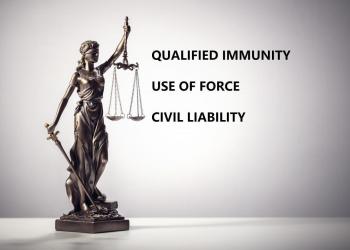
Deadly Force, Qualified Immunity and Civil Liability: We’re Not in California Anymore with This Case
The lack of prior case authority determining that the use of deadly force in a potentially dangerous situation is unconstitutional will generally provide officers with qualified immunity from civil liability.
Where the issue is a child’s Fourteenth Amendment substantive due process deprivation of his or her interest in the companionship of a parent, only official conduct that “shocks the conscience” is sufficient to provide a remedy. Also, it must be shown that actual deliberation before the force was used was practical under the circumstances.
Two Lyon County, Nevada, law enforcement officers responded to a 911 call related to a domestic violence incident at a private residence. The initial call did not request any emergency medical care nor report the involvement of any weapons. Upon arrival, the officers knocked on the front door and announced their presence. Two minor children—both described as “distressed”—came out of the house and spoke with the officers in the front yard. They told the officers that their parents were fighting and that their mother needed an ambulance. A medic was called to respond to the scene. While awaiting the arrival of an ambulance, the children told the officers that there were no weapons in the house other than a BB gun, but that their father was “throwing (their mother) around.”
Leaving the children in the front yard, the officers again approached the front door, announced their presence, and, with one of the officers drawing his weapon, made entry into the house. Robert Anderson—from down an adjoining hallway and out of view—shouted; “F*** you punks.” Following the direction of Anderson’s voice, the officers moved toward the hallway just off the kitchen. Anderson—5 foot, 8 inches tall and 185 pounds (smaller than either of the two officers)—was observed standing at the far end of the hallway. It was noted at this time that he was unarmed and shirtless, with nothing in either his waistband or his hands. The second officer drew his weapon about this time.
With both officers still in the kitchen at that opposite end of the hallway, Anderson was ordered to get on the ground. Ignoring the officers’ commands, he suddenly ran toward them. Both officers fired their weapons (three and two shots), hitting him in the torso with all five shots. Per later testimony (as recorded on the officers’ bodycams and as reported in the dissenting opinion), one officer fired the first shot from three to five feet as Anderson reached their end of the hallway. He fired the second shot at near point-blank range as Anderson passed in front of him. There was some indication that Anderson made a grab at the first officer’s gun as he passed. The third shot was fired at Anderson’s back as Anderson fell forward into the kitchen.
The other officer fired a single shot at Anderson after the first officer had fired two shots and after Anderson had entered the kitchen. It was unexplained when the second officer fired his second shot. Anderson died at the scene. Anderson’s wife and children later sued the officers and Lyon County in federal court, alleging (1) a violation of the Fourth Amendment for using excessive force, and (2) the Fourteenth Amendment (substantive due process) for interfering with a familial relationship with his wife and children.
The federal district (trial) court granted the civil defendants’ (the officers’) motion for summary judgment, ruling that the officers and the county were entitled to qualified immunity. The plaintiffs appealed.





